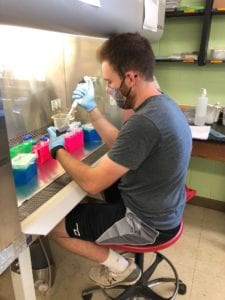WEST LIBERTY, W.Va., July 6, 2020 — Summer research continues this year at West Liberty University despite the pandemic, as undergraduate students take part in the annual Topper-SURE program.

The nine-week schedule offers students a chance to gain valuable experience that will assist them in graduate school and their future careers. It also provides a $3,000 stipend.
“We began our annual Topper-SURE program on June 1 and it’s been going well. We continue it for nine weeks until July 31,” said Dr. Deanna Schmitt, assistant professor of biology in WLU’s College of Sciences Department of Natural Sciences and Mathematics.
“Every faculty member involved uses a slightly difference way of dealing with the pandemic due to the nature of the different research. So there are a variety of approaches due to the pandemic,” she said.
For example, students working in Dr. Matthew Zdilla’s skull morphometrics lab can work virtually doing computer analysis.
In Schmitt’s and Dr. Holly Racine’s lab, the students work in the biology lab and adhere to strict social distancing rules and wear masks.
Other students like those in Dr. Zachary Loughman’s laboratory are studying crayfish, snails, ticks and snakes in the field and are not on campus much. All of these studies are being performed locally, and will lead to a better understanding of the region’s biodiversity.
“The Topper-SURE program allows students to explore different areas of research while developing critical thinking and problem-solving skills,” said Dr. Karen Kettler, Dean of the College of Sciences.
“At West Liberty University, we believe that the best way to become a scientist is to engage in experiential learning. Faculty participating in Topper-SURE mentor students as they engage in the entire scientific process, from hypothesis development to data analysis. The experience is invaluable.
For example, students in Dr. Schmitt’s laboratory study resazomycins, a novel family of antibiotics that exhibit bactericidal activity against select bacteria including the causative agent of gonorrhea, Neisseria gonorrhoeae.
Students Justin Rice of New Martinsville, W.Va. and Janelle Stack of Lusby, Md. are working to determine the mechanism of action of these antibiotics and the effect oxygen concentration has on the efficacy of resazomycins.
Dr. Diana Barber’s lab is in the field almost every evening with ultrasonic detectors/recorders listening to echolocation calls in order to identify native bats in our region. Students participating in this research include Julia Purks, Richmond, Ohio and Christopher Lloyd, Sutton, W.Va..
“Our project focus shifted this summer, because we are not doing any research that would have required physical contact with bats by our WVDNR partners. As an added precaution, we wear masks when we are together and follow social distancing guidelines,” Barber said.
Because of travel limitations associated with COVID, Dann’s student Mariah Cashbaugh, Canfield, Ohio, has focused on looking at earthworm communities in and around WLU’s campus. His main focus is studying the distribution and abundance of the invasive worm Amynthas, referred to as the “crazy worm,” found in campus woods.
Additional students performing SURE research and their hometowns include:
Hannah Ankrom, Sistersville, W.Va., Elizabeth Cika, Martins Ferry, Ohio, Carson Carrick, Wheeling, W.Va., James Krochmal, Gallway, Ohio, Mitchel Loughman, Eighty-Four, Pa., Lindsey Morais, Clarksburg, W.Va., Emily Reedy, Grosse Ile, Mich., Brian Ringhiser, Grove City, Ohio and Addie Shanor, Claysville, Pa.
This year there are six biology faculty involved in the research program. Besides Loughman, Zdilla and Schmitt, there are three new faculty members mentoring summer research, Jeremiah Dann, Dr. Diana Barber and Dr. Holly Racine’s programs.
SURE, which stands for summer undergraduate research experience, is funded with support from the West Virginia Higher Education Policy Commission’s Division of Science and Research. Additional dollars comes from NIH, WV-INBRE, WV-NASA Space Grant Consortium, the WV Research Challenge Fund, and the WLU Foundation.
Students taking part in the SURE at WLU this summer will not have the end of research symposium as they have in the past due to COVID-19 but they may present their work at a later date, according to Schmitt.
West Liberty University is West Virginia’s oldest public university and offers more than 70 undergraduate majors, plus a growing number of graduate programs, both online and on campus. For more information, please call 1.866.937.8542 (WESTLIB) or follow WLU on social media. To view more about WLU, please visit westliberty.edu/youtube.